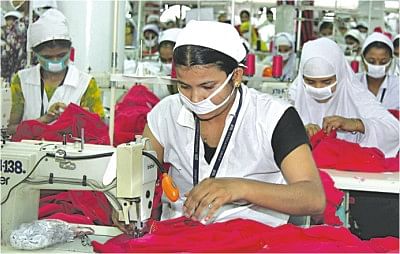Concerted effort a must to double RMG exports

Workers are pictured at a garment factory in Gazipur. Apparel orders are gradually shifting to Bangladesh from China. Photo: STAR
Aconcentrated effort is needed to achieve McKinsey and Company's projection of doubling RMG exports of Bangladesh by 2015, experts said yesterday.
They said the country needs to develop infrastructure and products quality and improve productivity, supply of gas and power to industries, workers' skills and financing to the industrial sector to achieve the target.
The German-based McKinsey and Company released a survey report on Bangladesh's RMG industry in December last year and also predicted that RMG exports will triple in the next 10 years.
Bangladesh exported RMG products worth $17.91 billion in last fiscal year and set the new target at $20.36 billion for 2011-12.
Bangladesh Enterprise Institute (BEI) orgainsed a seminar yesterday at its office in Dhaka to discuss different issues regarding the report.
At the programme, Mustafizur Rahman, executive director of Centre for Policy Dialogue (CPD), said the process of achieving the target depends on different factors. "First of all we have to do our homework to achieve the target."
Financing in the sector has become a problem, he said, adding that the country needs to reduce lead-time for gaining new markets and retaining the existing markets.
"Time has come to think whether we can set up a central bonded warehouse or not as the single stage GSP is introduced in the EU," he said. Rahman also suggested for increasing south-south trade volume like grabbing the Japanese, Turkey and Indian markets.
He said the US did not meaningfully implement the given duty-free access of 97 percent products of least developed countries (LDCs). Hope for a duty-free access to the US market may not come true, as there is no bill in the US senate in 2012.
Commerce Secretary Ghulam Hussain asked garment makers not to expect too much from the government side in this regard. "Rather, I suggest sensitising all stakeholders to work in partnership to achieve the target."
Bangladesh achieved more than 20 percent export growth over the last few years without any prediction from such survey report, he said. "I think it is possible to achieve the target through public private partnership, although it is an ambitious report," he said.
As a discussant, Shafiul Islam Mohiuddin, president of Bangladesh Garment Manufacturers and Exporters Association, said lack of coordination from the government machinery is the biggest problem in the sector now. "The economic agenda is not in the priority list of the government machinery," he said.
He said Bangladesh cannot grab Chinese orders at the expected level as these are getting shifted to Latin American countries for the style in sales.
"Rather, we sell the best garment at a competitive price," he said. But, McKinsey and Company's report is fantastic, and some extraordinary things are also taking place in the country like supplying fabrics to China for making world cup jerseys, he said.
Saiful Islam, president of Bangladesh-German Chamber of Commerce and Industry (BGCCI), said the chamber worked for the last two years with McKinsey to prepare the report.
In the report, the interviewed chief purchasing officers of globally renowned brands stressed the need for improved road, railway and energy infrastructure in the country to achieve the target, he said.
He said overcoming the problems of skills development of workers and infrastructures is possible through public private partnership. "It is a realistic figure to target $46 billion in the next 10 years," he said.
"We have never invested money in vocational training institutes for developing skilled workers," said Daniel Siedl, executive director of BGCCI.
Bangladeshi entrepreneurs should be allowed to set up textile mills in India with 100 percent ownership, said A Matin Chowdhury, managing director of Malek Spinning Mills.
"We want to establish cooperation in business between India and Bangladesh, not dependency on India," he said.
India set a ban on export of cotton and later on yarn last year when Bangladesh's textile sector was facing troubles, said Chowdhury.
Currently, the country's the backward linkage industry can meet 80 percent demand for knitwear and 40 percent for woven fabrics locally, said Feroz Ahmed, secretary general of Bangladesh Textile Mills Association (BTMA).
Citing India as a major factor to achieve the target, he said sometimes price volatility affects the sector seriously.
Bangladesh needs foreign direct investment in garment sector to boost export, said Ahsan H Mansur, executive director of Policy Research Institute of Bangladesh.
"We have to achieve the target on our own strength, as duty- and quota-free access to the US may not be possible," he said.
BEI President Farooq Sobhan moderated the function while former BTMA president Abdul Hai Sarker, senior research fellow of CPD Khondker Golam Moazzem and Asian Tiger Capital Managing Partner Ifty Islam also spoke.

 For all latest news, follow The Daily Star's Google News channel.
For all latest news, follow The Daily Star's Google News channel. 



Comments